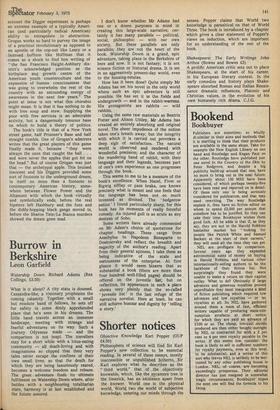Bookend
Bookbuyer
Publishers are sometime.; so wholly di3similar in their aims and methods that it is startling to think that their products are available in the same shops. Take for example the New English Library on one hand and Routledge and Kegan Paul on the other. Routledge have published just one novel In the Country of the Shin by Peter Redgrove, and despite a big publicity build-up around that one, have no more to bring out in the near future. Apparently about 150 MSS have been considered, of which perhaps twenty-five have been read and reported on in detail. Of these only one is being seriously considered for publication, and that may need rewriting. The way Routledge explain it, they have no fiction editor on whom to spend 0,000 per annum that somehow has to be justified. So they can take their time. Bookbuyer wishes them good luck. All he adds is that if, as they say, they are not in the Harold Robbins bestseller market but "looking for people like Patrick White and Samuel Beckett at the start of their careers," they will need all the time they can get.
NEL are profligate by comparison.
Several years ago they expended astronomical sums of money on buying in Harold Robbins and various other internationally-selling authors to be the backbone of their fiction list. Not surprisingly they found they were unable to make a return on their capital outlay. What to do? Obviously if large advances and generous royalties proved unprofitable they must inaugurate a kind of fiction publishing which required low advances and low royalties — or no royalties at all. So NEL have gathered around them a team of fast, efficient writers capable of producing mass-con sumption artefacts at short notice, for which they are paid an advance of E100 or so. The cheap, low-cost novels produced are then either bought outright by NEL or contracted for with a 3 per cent or 4 per cent royalty payable to the writer. If this seems low, consider: the book is likely to sell in sufficient numbers for royalty payments, even at this level, to be substantial; and a writer of this sort who leaves NEL is unlikely to be welcomed by any other publishing house in London. NEL, of course, are becoming exceedingly prosperous. Their editorial director has just resigned in somewhat tragic circumstances; Bookbuyer hopes the next one will find the formula to his liking.


































 Previous page
Previous page